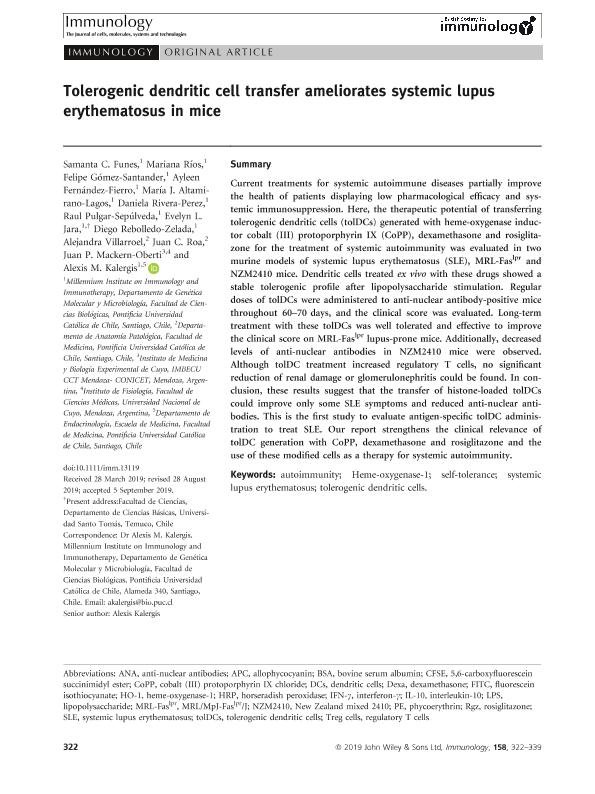Mostrar el registro sencillo del ítem
dc.contributor.author
Funes, Samanta Celeste

dc.contributor.author
Ríos, Mariana
dc.contributor.author
Gómez Santander, Felipe
dc.contributor.author
Fernández Fierro, Ayleen
dc.contributor.author
Altamirano Lagos, María J.
dc.contributor.author
Rivera Perez, Daniela
dc.contributor.author
Pulgar Sepúlveda, Raul
dc.contributor.author
Jara, Evelyn L.
dc.contributor.author
Rebolledo Zelada, Diego
dc.contributor.author
Villarroel, Alejandra
dc.contributor.author
Roa, Juan C.
dc.contributor.author
Mackern Oberti, Juan Pablo

dc.contributor.author
Kalergis, Alexis M.
dc.date.available
2023-12-04T11:25:58Z
dc.date.issued
2019-09
dc.identifier.citation
Funes, Samanta Celeste; Ríos, Mariana; Gómez Santander, Felipe; Fernández Fierro, Ayleen; Altamirano Lagos, María J.; et al.; Tolerogenic dendritic cell transfer ameliorates systemic lupus erythematosus in mice; Wiley Blackwell Publishing, Inc; Immunology; 158; 4; 9-2019; 322-339
dc.identifier.issn
0019-2805
dc.identifier.uri
http://hdl.handle.net/11336/219136
dc.description.abstract
Current treatments for systemic autoimmune diseases partially improve the health of patients displaying low pharmacological efficacy and systemic immunosuppression. Here, the therapeutic potential of transferring tolerogenic dendritic cells (tolDCs) generated with heme-oxygenase inductor cobalt (III) protoporphyrin IX (CoPP), dexamethasone and rosiglitazone for the treatment of systemic autoimmunity was evaluated in two murine models of systemic lupus erythematosus (SLE), MRL-Faslpr and NZM2410 mice. Dendritic cells treated ex vivo with these drugs showed a stable tolerogenic profile after lipopolysaccharide stimulation. Regular doses of tolDCs were administered to anti-nuclear antibody-positive mice throughout 60–70 days, and the clinical score was evaluated. Long-term treatment with these tolDCs was well tolerated and effective to improve the clinical score on MRL-Faslpr lupus-prone mice. Additionally, decreased levels of anti-nuclear antibodies in NZM2410 mice were observed. Although tolDC treatment increased regulatory T cells, no significant reduction of renal damage or glomerulonephritis could be found. In conclusion, these results suggest that the transfer of histone-loaded tolDCs could improve only some SLE symptoms and reduced anti-nuclear antibodies. This is the first study to evaluate antigen-specific tolDC administration to treat SLE. Our report strengthens the clinical relevance of tolDC generation with CoPP, dexamethasone and rosiglitazone and the use of these modified cells as a therapy for systemic autoimmunity.
dc.format
application/pdf
dc.language.iso
eng
dc.publisher
Wiley Blackwell Publishing, Inc

dc.rights
info:eu-repo/semantics/openAccess
dc.rights.uri
https://creativecommons.org/licenses/by-nc-sa/2.5/ar/
dc.subject
AUTOIMMUNITY
dc.subject
HEME-OXYGENASE-1
dc.subject
SELF-TOLERANCE
dc.subject
SYSTEMIC LUPUS ERYTHEMATOSUS
dc.subject
TOLEROGENIC DENDRITIC CELLS
dc.subject.classification
Inmunología

dc.subject.classification
Medicina Básica

dc.subject.classification
CIENCIAS MÉDICAS Y DE LA SALUD

dc.title
Tolerogenic dendritic cell transfer ameliorates systemic lupus erythematosus in mice
dc.type
info:eu-repo/semantics/article
dc.type
info:ar-repo/semantics/artículo
dc.type
info:eu-repo/semantics/publishedVersion
dc.date.updated
2023-12-04T10:12:20Z
dc.journal.volume
158
dc.journal.number
4
dc.journal.pagination
322-339
dc.journal.pais
Reino Unido

dc.journal.ciudad
Londres
dc.description.fil
Fil: Funes, Samanta Celeste. Pontificia Universidad Católica de Chile; Chile. Universidad Católica de Chile; Chile. Consejo Nacional de Investigaciones Científicas y Técnicas; Argentina
dc.description.fil
Fil: Ríos, Mariana. Universidad Católica de Chile; Chile. Pontificia Universidad Católica de Chile; Chile
dc.description.fil
Fil: Gómez Santander, Felipe. Universidad Católica de Chile; Chile. Pontificia Universidad Católica de Chile; Chile
dc.description.fil
Fil: Fernández Fierro, Ayleen. Pontificia Universidad Católica de Chile; Chile. Universidad Católica de Chile; Chile
dc.description.fil
Fil: Altamirano Lagos, María J.. Universidad Católica de Chile; Chile. Pontificia Universidad Católica de Chile; Chile
dc.description.fil
Fil: Rivera Perez, Daniela. Universidad Católica de Chile; Chile. Pontificia Universidad Católica de Chile; Chile
dc.description.fil
Fil: Pulgar Sepúlveda, Raul. Pontificia Universidad Católica de Chile; Chile. Universidad Católica de Chile; Chile
dc.description.fil
Fil: Jara, Evelyn L.. Universidad Católica de Chile; Chile. Pontificia Universidad Católica de Chile; Chile
dc.description.fil
Fil: Rebolledo Zelada, Diego. Universidad Católica de Chile; Chile. Pontificia Universidad Católica de Chile; Chile
dc.description.fil
Fil: Villarroel, Alejandra. Pontificia Universidad Católica de Chile; Chile. Universidad Católica de Chile; Chile
dc.description.fil
Fil: Roa, Juan C.. Universidad Católica de Chile; Chile. Pontificia Universidad Católica de Chile; Chile
dc.description.fil
Fil: Mackern Oberti, Juan Pablo. Consejo Nacional de Investigaciones Científicas y Técnicas. Centro Científico Tecnológico Conicet - Mendoza. Instituto de Medicina y Biología Experimental de Cuyo; Argentina
dc.description.fil
Fil: Kalergis, Alexis M.. Pontificia Universidad Católica de Chile; Chile. Universidad Católica de Chile; Chile
dc.journal.title
Immunology

dc.relation.alternativeid
info:eu-repo/semantics/altIdentifier/url/https://onlinelibrary.wiley.com/doi/abs/10.1111/imm.13119
dc.relation.alternativeid
info:eu-repo/semantics/altIdentifier/doi/http://dx.doi.org/10.1111/imm.13119
Archivos asociados
